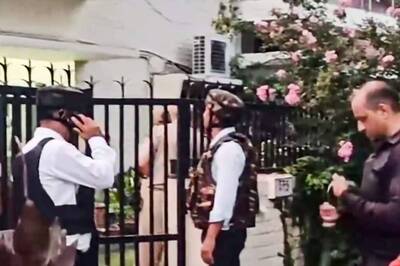
views
Chennai: Prime Minister Manmohan Singh on Monday stressed on attracting the young Indian diaspora through joint research projects while urging Indian scientists to "think big" and "out of the box" for scientific advancement and innovations in the country.
"I would like to see more joint research projects between Indians in India and those abroad so that we can draw on this global talent pool and strengthen our own teaching and research base. The high speed National Knowledge Network will greatly facilitate such collaborations," Manmohan Singh said in his inaugural address at the 98th Indian Science Congress here.
To Indian scientists, he said: "The time has come for Indian scientists to once again think big; think out of the box; and think ahead of the times. The time has come for India to produce the Ramans and Ramanujans of the 21st Century," the prime minister said.
He was referring to eminent physicist CV Raman and renowned mathematician Srinivasa Ramanujan - both from Tamil Nadu.
Raman was the recipient of the Nobel Prize for Physics in 1930 for the discovery that when light traverses a transparent material, some of the light that is deflected changes in wavelength. Ramanujan was a mathematician who had no formal training in pure mathematics but made substantial contributions to mathematical analysis.
He, however said that the application of scientific knowledge to human and social development must be value-based.
"How science is used depends on the values and priorities of the time in society. Thus splitting of the atom led on the one had to the bomb and on the other to nuclear energy. One kills; the other has extended the bounds of developmental possibilities on a planet worried about carbon emissions and climate change."
Referring to the development of synthetic chemistry finding use in developing poison gas used in wars and of agro chemicals and pharmaceuticals, he said: "The application of scientific knowledge to human and social development must be value-based even though science may itself be value neutral."
Citing modern developments in bio-sciences, Manmohan Singh said: "We are now acquiring the capacity to manipulate the human genome. But we have not yet developed an ethical framework that defines red lines that we must not cross as we do this."
The prime minister said that ethics for science needed further discussion. He urged the scientific community to discuss and deliberate on questions like whether scientists should step beyond their discipline and guide the social discourse on the use of scientific knowledge. Another questions to be deliberated is whether a code of conduct should defines the limits within which scientists will work on the application of their discoveries.
Referring to the poor translation of good science and research into marketable products in India, he urged the congress to come up with recommendations on strengthening the link between Indian universities, research laboratories and industry.
The prime minister stressed on the need to better higher education in the country and claimed that the government was already moving forward in this direction.
"Our government has paid special attention to the growth of our university system. In the past six years, our government has established eight new Indian Institutes of Technology and five institutes" of higher education and research, he said.
He said that 2012-13 will be the centenary year of the Indian Science Congress and asked the Ministry of Science and Technology to designate 2012-13 as the Year of Science in India.
"We have to make a concerted effort at building and motivating a new generation of scientific talent. To this end we had launched the INSPIRE or Innovation in Science Pursuit for Inspired Research Programme. More than 350,000 students in the age group 10-27 years have received awards and scholarships under this scheme," Manmohan Singh said.
"The growth of our economy, defence of our people and security of our people depends of scientific and technological competence," he said declaring the congress open.
The biggest conclave of Indian science has some 7,500 scientists, including six Nobel laureates, from across the world attending.
The congress at SRM University in Kattankulathur near here is the 98th held in India uninterrupted since 1914.
The congress is always inaugurated on January 3 by the prime minister and chaired by the chief minister of the host state. However, Tamil Nadu Deputy Chief Minister MK Stalin chaired the event on Monday.

















Comments
0 comment